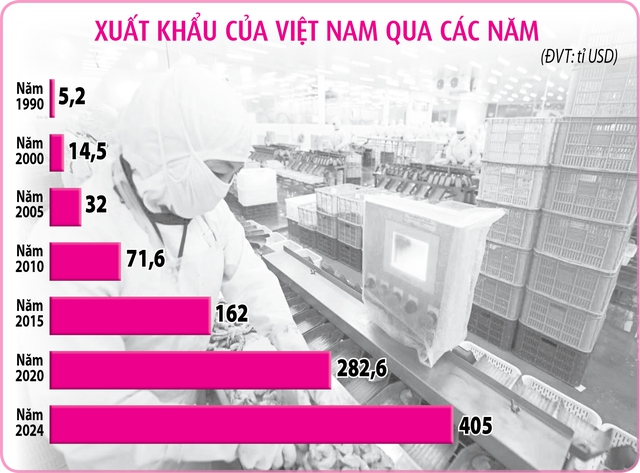From a nearly empty treasury…
Looking back at eight decades of Vietnam's economic development, economist and Doctor Nguyen Minh Phong has not forgotten the extremely difficult period after 1945. The newly formed government had to confront three enemies: famine, illiteracy, and foreign invasion. It had nothing but a backward agricultural economy, severely damaged by war; prolonged floods and droughts rendered more than half of the land uncultivable; and famine was rampant. Production sectors declined and stagnated, goods became scarce, and the market was paralyzed and desolate. The treasury was completely empty. "That year, inflation was skyrocketing. The price of rice, which was 4-5 dong per quintal, had risen to 700-800 dong per quintal by mid-1945. GDP per capita in 1945 was only 60 dong, with over 90% of the population illiterate. Therefore, at the very first meeting of the Provisional Government on September 3, 1945, President Ho Chi Minh outlined six urgent tasks, affirming that 'combating famine' was the top priority, the most urgent and immediate task," Mr. Phong recounted.
Photo: Dao Ngoc Thach - Graphics: Van Nam
" The government and the entire population joined hands in rebuilding the country, boosting production, and redistributing public land more rationally. In particular, they implemented a policy of broad national unity among all segments and classes of society, from farmers and workers to merchants and industrialists… Thanks to this, by 1946, famine had been fundamentally eradicated throughout the country," Dr. Nguyen Minh Phong recalled with emotion.
By October 1950, Vietnam officially established and expanded economic and trade relations with socialist countries, including China and the Soviet Union, to promote the exploitation of forest and agricultural resources and improve people's lives. Thanks to this, the economic recovery in the North achieved many great successes during this period. By 1953, for the first time since the August Revolution, state budget revenue exceeded expenditure by 16%.
However, according to Dr. Nguyen Minh Phong, economic development in the context of the war against destruction in the North and the national liberation revolution in the South remained extremely difficult. By 1975, when the country was unified, the per capita GDP in the North was only estimated at 232 dong, equivalent to 80 USD (at the exchange rate at that time). Not to mention, the newly unified country had to enter two wars to defend the southwestern and northern borders, along with the embargo and isolation imposed by the West. The national economy was almost exhausted, and infrastructure and transportation were devastated.
The centrally planned economy struggled for ten years until the Sixth Party Congress (December 1986), when Vietnam reached a crucial, vital milestone, marking the first economic reform, through the liberalization of thinking and perspectives and the transformation of the economic model. Thanks to this, the country overcame the crisis and became one of the most dynamic economies with a remarkably large GDP. However, the difficulties were far from over…
...to break through the encirclement and isolation
Economist and financial expert Bui Kien Thanh, who served as an advisor to three generations of Prime Ministers and actively participated in the reform process and campaigned to lift the embargo on Vietnam, recalled that although a turning point in reform had been achieved, the challenge at that time was how to break through the long-standing isolation and embargo in order to develop.
With a post-war economy devastated and severely restricted in international trade, according to Mr. Bui Kien Thanh, "even just earning enough to eat was a struggle, let alone achieving development." In reality, nearly 20 years (1975-1994) of embargo negatively impacted Vietnam's economy, restricting trade development, resulting in weak international import and export of goods and services, and disrupting or hindering cross-border trade. This led to limitations in accessing capital, technology, and global markets – essential tools for economic reconstruction and post-war recovery. The embargo also prevented Vietnam from accessing partners connected to the US market to expand trade and attract investment. Therefore, even after abandoning the centrally planned economy in 1986, Vietnam's economy struggled to accelerate due to the constraints on trade.
Going back in history, in 1973, the US withdrew its troops from Vietnam, and by April 1975, the country was reunified, achieving independence and national unity. However, also in 1975, the US imposed a trade embargo on Vietnam. From 1977 to 1978, negotiations to normalize relations between the two sides were unsuccessful due to differing viewpoints. After many years of tireless efforts through negotiations, lobbying, diplomacy, and exchanges between the two countries, in February 1994, US President Bill Clinton announced the complete lifting of the embargo against Vietnam, marking the beginning of a period of normalization and cooperation. In November 1995, Prime Minister Vo Van Kiet and President Clinton officially announced the establishment of diplomatic relations between Vietnam and the US. Two years prior, in 1993, Vietnam had become a member of the World Bank, the International Monetary Fund, and the Asian Development Bank.
Last year, on the occasion of the 30th anniversary of the US lifting the embargo on Vietnam, the then US Consul General in Ho Chi Minh City remarked that this event paved the way for all the remarkable progress the two countries have made in bilateral trade and economic relations. The figures themselves demonstrate the results since 1995. For example, in 2022, bilateral trade reached nearly $139 billion, a 300-fold increase compared to 1995. "This means Vietnam is the eighth largest trading partner of the US globally and the largest trading partner of the US in ASEAN. The US is Vietnam's second largest trading partner and its largest export market. We have strong confidence in Vietnam's importance in global supply chains," he said.
Expert Bui Kien Thanh agrees that the normalization of relations with the US has opened up many opportunities for Vietnam to cooperate with many countries around the world. "The greatest achievement Vietnam has attained is its increasingly elevated national position and deep integration with the global economy by attracting hundreds of billions of USD in foreign investment, becoming one of the top 20 countries in the world in terms of international trade volume, signing 17 bilateral and multilateral free trade agreements (FTAs), and connecting with more than 60 developed and key economies globally," he said.
...and venture out into the open sea.
Thanks to the removal of trade blockades, in 1995, Vietnam began applying for membership in the World Trade Organization (WTO); signed a Framework Agreement on Economic Cooperation with the EU, joined ASEAN; in 1996 participated in founding the Asia-Europe Forum with 25 members; in 1998, Vietnam officially joined APEC – a significant milestone in economic integration. Particularly, in 2000, the Vietnam-US Trade Agreement was signed, leading to a continuous increase in Vietnamese goods entering the US market. This also created an important stepping stone for joining the WTO in 2007. Dr. Nguyen Minh Phong assessed that the most notable result of joining the WTO was that it transformed Vietnam into a highly open economy and continuously improved its trade balance, shifting from a trade deficit to a trade surplus.
Important cooperation agreements with the world, the region, and other countries have opened new horizons for Vietnam's take-off. From negligible export turnover, with no statistical data available, even reaching only US$2.4 billion in 1990, this figure reached US$15.1 billion in 2001. Trade between Vietnam and countries around the world has also increased significantly. In 2024, import and export turnover reached over US$786 billion, with a trade surplus of nearly US$24.8 billion. From mainly exporting to Eastern European countries, Vietnam now has economic and trade relations with 176 markets.
Dr. Vo Tri Thanh, former Deputy Director of the Central Institute for Economic Management Research, affirmed that international economic integration has opened up many opportunities to promote the country's economic growth and development, especially in the field of attracting foreign direct investment (FDI).
Specifically, after the Doi Moi (Renovation) period, from 1988 to 1990, Vietnam attracted $1.6 billion in FDI, a figure that surged to $17 billion in the period from 1991 to 1995. By 1996, one year after the normalization of relations between Vietnam and the US, FDI into Vietnam jumped to $10 billion, gradually increasing in subsequent years, and by 2024, the total foreign investment had reached approximately over $38 billion. "FDI remains an important channel for the Vietnamese economy, making a significant contribution to total social investment and state budget revenue. Many large corporations with strong financial and technological potential worldwide, such as Samsung, Intel, Apple, LG, etc., are present in Vietnam, contributing to changing the level of production as well as the Vietnamese brand's image globally. Recently, FDI has created a spillover effect of technology, contributing to raising the level of technology through transfer, creating competitive pressure and technological innovation for domestic businesses...", Mr. Thanh emphasized.
"Although my generation didn't witness the historic moment when President Ho Chi Minh read the Declaration of Independence – giving birth to the Democratic Republic of Vietnam – being immersed in the country during these days evokes a very unique and overwhelming emotion," shared Dr. Vo Tri Thanh. For him, over the past 80 years, Vietnam's economy has overcome many ups and downs and undergone spectacular changes. What he feels most strongly is that no matter how difficult the circumstances, the Vietnamese people and nation have maintained their indomitable spirit. This is also the foundation for Vietnam to enter a new era – an era of national resurgence, as called for by the Party and the State.
The Vietnamese people are a nation striving forward, not only looking to the past but also constantly observing, looking around, and looking towards the future. Especially in this new era, we must not forget the times when the country faced famine, illiteracy, and foreign invasion, and countless difficulties. President Ho Chi Minh always said that we must find a way for Vietnam to stand shoulder to shoulder with the world's great powers. That is a simple lesson that we need to remember in this era of self-improvement.
Dr. Vo Tri Thanh
Former Deputy Director of the Central Institute for Economic Management Research
Thanhnien.vn
Source: https://thanhnien.vn/hanh-trinh-den-khat-vong-thinh-vuong-185250822230854662.htm









![[Photo] The General Secretary presents the title of Hero of the People's Armed Forces to the Navy.](https://vphoto.vietnam.vn/thumb/1200x675/vietnam/resource/IMAGE/2026/02/28/1772251730336_vna-potal-tong-bi-thu-to-lam-du-va-trao-danh-hieu-anh-hung-llvt-nhan-dan-cho-quan-chung-hai-quan-8612073-jpg.webp)































































































Comment (0)